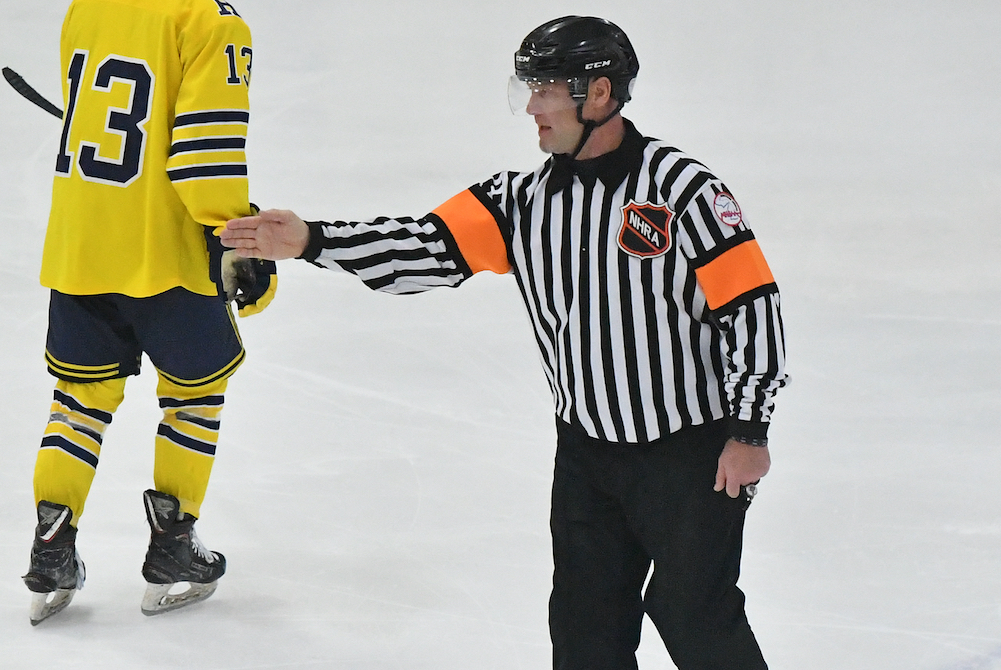
Retired NHL-er Back on Ice to Answer Call - By Making Them
By
Rob Kaminski
MHSAA benchmarks editor
March 16, 2023
The most accomplished skater on the ice during Friday’s triple-overtime MHSAA Division 1 Semifinal hockey thriller between Hartland and Brighton was not wearing the school colors of either team.
In front of a packed house at Plymouth’s USA Hockey Arena, referee Bryan Smolinski was in stripes, just like the rest of his officiating crew.
In his former life, he pulled on plenty of sweaters before lacing up the skates. That happens when one logs more than 1,000 games, tallies nearly 300 goals (274) and close to 400 assists (377) with eight teams spanning a 15-year playing career in the National Hockey League.
So, how did the 52-year-old former star player find himself on the ice last weekend as one of the referees for the pinnacle weekend of this high school season? Good question, even for the man known as “Smoke” during his playing days.
“I was working in youth development programs a few years back and reached out to some Michigan guys I had connections with about other ways to help the game,” Smolinski said. “I called Kevin May just to chat and asked, ‘Hey, how’s your reffing going?’ He said, ‘You know, we’re down a little bit,’ then said, ‘Why don’t you do it?’ I said, ‘Not a chance,’” Smolinski laughed.
Never Say Never
May persisted, imploring his friend to skate with him during a Fall league at Cranbrook in Bloomfield Hills. After eight weeks, once a week, Smolinski had a revelation.
“I’m like, ‘I’m kind of diggin’ this,’” Smolinski said “So, I did all the testing, and the educational part of it, and I really enjoyed it. I got with Danny (DiCristofaro) and his group, and he put me in as much as he could, and I really started to get my feet wet.”
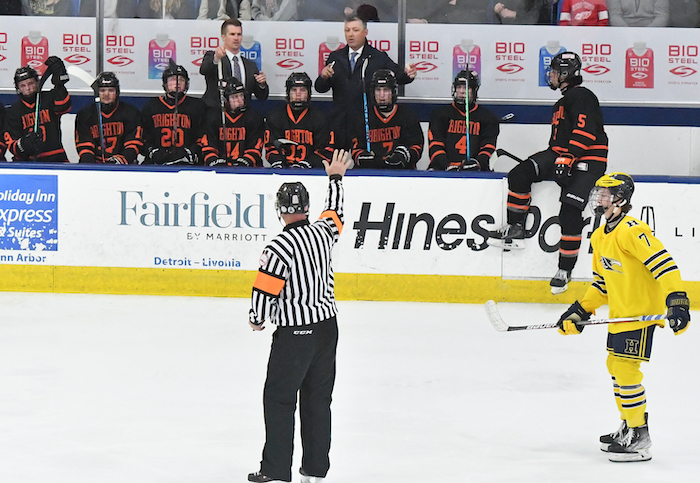 DiCristofaro is the assigner and referee-in-chief for the MHSAA’s Northeast Hockey Referees Association, and he has seen Smolinski’s growth first-hand.
DiCristofaro is the assigner and referee-in-chief for the MHSAA’s Northeast Hockey Referees Association, and he has seen Smolinski’s growth first-hand.
“Obviously he’s got great instincts and a feel for the game, along with a wealth of experience, all of which has allowed him to climb the ladder quickly,” said DiCristofaro. “It’s been a joy to watch his growth as an official.”
Fast forward to last Friday, and there were Smolinski and May sharing duties as referees during the MHSAA Semifinal with linesmen Michael Andrews and Thomas Robbins.
In between, there has been a learning curve that still continues, but the jump to officiating was not quite as daunting as his introduction to the NHL.
“I was scared to death. My first game was against Mario Lemieux. I’m in the old Boston Garden and now I’m playing against these guys and it’s their job, and they’re out there trying to make a living,” Smolinski recalled.
The emotions were not running nearly as frenzied for his first game as an MHSAA official, obviously, yet respect came in a different form.
“I couldn’t pick the puck up, I was breathing heavily; it was Kevin and me doing a two-man game in Brighton,” Smolinski recalled. “There were a few high-end kids playing, and I’m thinking, ‘I’m dying here.’ You know, there’s no training for that first time.”
What that experience did, however, was revitalize Smolinski in a new way. His playing career is well documented, not only in the NHL, but around Michigan. He enjoyed an honor-laden career at Michigan State University from 1989-93 before joining the Boston Bruins (who had drafted him three years earlier) at the end of the ’93 NHL campaign. Even after his final season, with Montreal in 2007-08, he stayed in the game via men’s leagues, or coaching his son, Max.
Smolinski and his wife, Julie, have three daughters: Ashtyn (22), Jojo (16) and Rylen (12), along with Max, whom dad coached for seven years including during a national championship run with a Little Caesars U15 team in 2019. Max, 19, is now playing collegiately at Rensselaer Polytechnic Institute.
So, for Smolinski, officiating offers a new chapter.
“Reffing brought back ... I wouldn’t say love of the game, because that’s always been there; it’s a different side of enjoying the game now. I have no horse in the race, my son’s off to college, my daughters are doing their thing; I wanted to find something new in the game,” Smolinski said. “I’ve coached, and I don’t want to do that. I found this, and I’ve stuck with it.”
Old College Ties
One of the great benefits of athletics at any level are the friendships made. For two kids who met in their first years on the MSU campus and forged a bond that lasts to this day, it’s amazing how their careers reached the pinnacle and have now come full circle.
Wes McCauley, an MSU teammate, is one of Smolinski’s best friends. After numerous years in the minor leagues, McCauley, like his friend, made it to the NHL. But McCauley made it as an official, working his first NHL game in 2003, when Smolinski was nearing the end of his playing career.
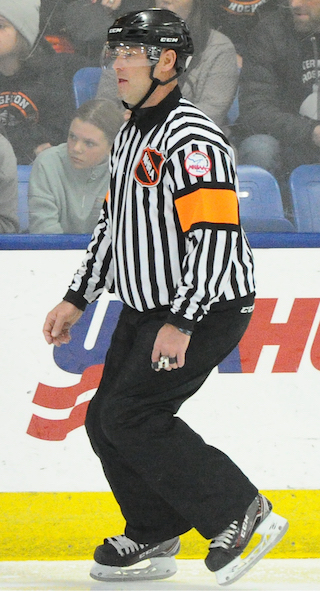 Their games lined up on just a few occasions in the NHL, and the two lobbied hard to have McCauley work Smolinski’s 1,000th career game in his final season with the Canadiens in 2007-08. The request, sadly, was denied by the league.
Their games lined up on just a few occasions in the NHL, and the two lobbied hard to have McCauley work Smolinski’s 1,000th career game in his final season with the Canadiens in 2007-08. The request, sadly, was denied by the league.
On the rare occasions when the friends did share the same ice, less than a handful by Smolinski’s count, it was McCauley who was forced to rebuff any attempts at fraternization. It’s just part of an official’s edict.
“For both of us, it was amazing; it was just great,” Smolinski said. “I’d say, ‘Hey man what’s up?’ and he says, ‘Can’t talk.’ I’m like, ‘What do you mean, we talk all the time.’ Again, he’s like, ‘Can’t talk, get away from me.’ You know, it was just business.”
McCauley then reached the 1,000-game plateau himself in 2018 and is still going strong as a regular selection for playoff duties with nine Stanley Cup Finals assignments, including last year.
So, it should have been natural for Smolinski to go to his old friend immediately for officiating pointers once he joined the ranks, right? Well, maybe not immediately.
“I talk to Wes all the time, but I actually hid it from him right out of the gate because I didn’t want to take his razzing. Eventually it got out, and he was loving it. He started sending me whistles and visors and pants,” Smolinski said, grinning. “And none of it fit, you know, because I’m older and fatter, and he’s so damn skinny. So, I still had to go out and get all new gear.”
Both Sides Now
Having been to the top of his profession, now moving to the other side of that same mountain that his friend McCauley scaled, the respect has grown for those blowing the whistle.
“The preparation for officiating is much more mental,” Smolinski said. “Way more rules oriented. You’re always trying to get away with things that you can as a player; now you have to police that.”
Smolinski has a distinct advantage.
“I know everything they’re trying to do because I’ve done it. I know where you’re going with the puck, I know what kind of breakout you’re trying to do,” Smolinski said. “I have all the instincts, now I just try to stay out of the way and not ruin their game. The most fun is watching the game develop and the ups and downs. For me to be out there and enjoy it with them, that’s the fun part.”
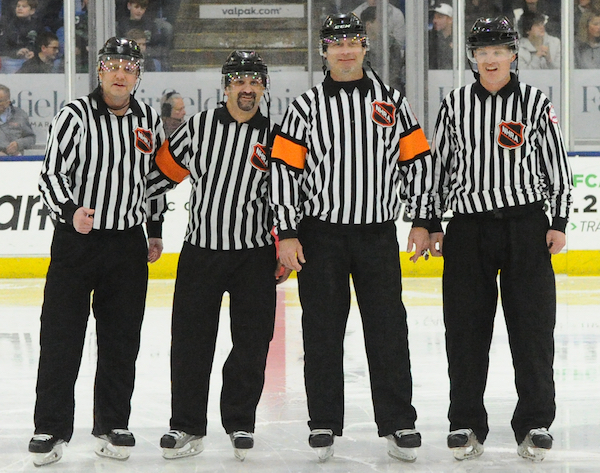 Those who have played hockey at any level have a built-in advantage should they consider the officiating avocation: the ability to skate. Unlike officiating in any other sport, skating is a prerequisite. This makes the pool limited, and almost solely composed of former players. Smolinski offers this advice.
Those who have played hockey at any level have a built-in advantage should they consider the officiating avocation: the ability to skate. Unlike officiating in any other sport, skating is a prerequisite. This makes the pool limited, and almost solely composed of former players. Smolinski offers this advice.
“I prefer sticking with high school because I think there’s more decorum, more administrative structure. Kids are playing for their schools, there’s loyalty there,” said Smolinski. “And there is more accountability. People need report to athletic directors and supervisors. Other levels can be more loosely governed, or a bit more maverick in nature. Moms and dads get involved more, coaches maybe know a little less,” said Smolinski.
He has, in fact, worked a handful of non-school games, and there’s a stark difference.
“I wanted to see what was going on, and I see it first-hand,” Smolinski said. “There are some crazy people and parents out there, and these guys are getting absolutely tortured. I’ve been tortured. There has to be a level of respect for what officials do. I think schools can rein that in a little more. All the guys I’ve met give up a lot of time and work hard because they love to do it and love the game.”
All sports need an assist from school administration and from those who once played the games to keep the officials recruitment moving in the right direction. People like Smolinski can help.
“He clearly doesn’t need to do this, and that’s what makes it so fantastic,” DiCristofaro said. “We need more people who have played – at any level – to do what he’s done and stay in the game as officials.”
Smolinski continues to promote the game in other ways as well. Currently, he is involved in the NHL’s Learn To Play initiative, which aims to inspire youth and welcome more families into the hockey community.
“We work hand-in-hand with the NHL Players Association for player development and industry growth,” Smolinski said. “Ages 5 to 9 are introduced to hockey, get head-to-toe gear and instruction, and meet some former players.”
The idea is to have fun first, which can translate into years and maybe even a lifetime in the sport. It’s a lifetime that has given Smolinski so much and continues to do so as he watches it unfold for others from his new vantage point.
PHOTOS (Top) MHSAA official Bryan Smolinski signals during Friday's Division 1 Semifinal between Brighton and Hartland. (2) Smolinski, a retired NHL standout, communicates with the Bulldogs' bench. (3) Smolinski keeps watch during game play. (4) Smolinski, third from left, with his crew: Michael Andrews, Kevin May and Thomas Robbins.
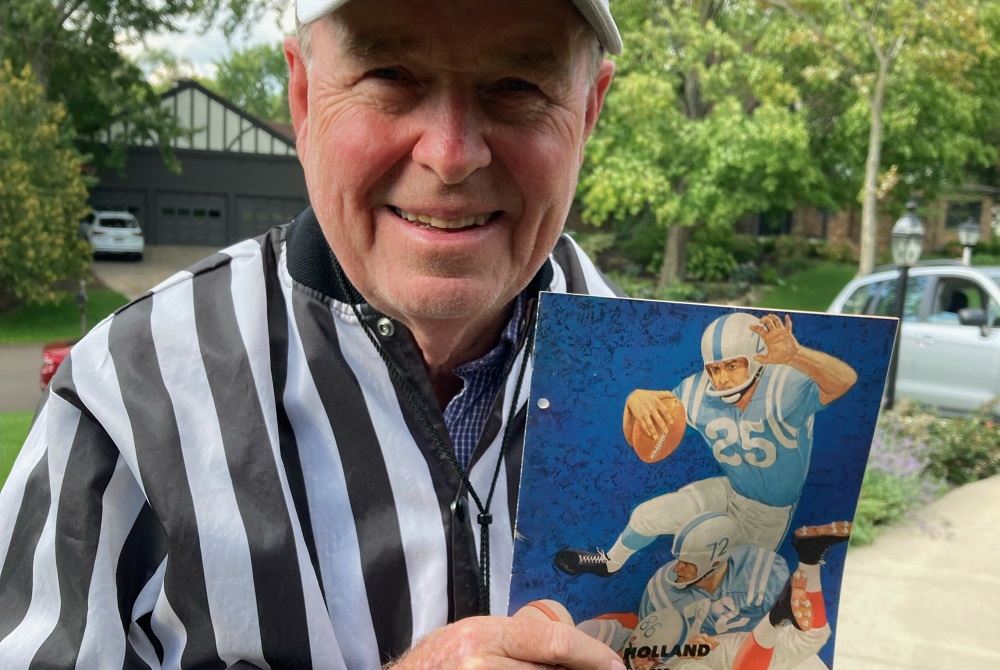
Friday Nights Always Memorable as Record-Setter Essenburg Begins 52nd Year as Official
By
Steve Vedder
Special for MHSAA.com
August 31, 2023
GRAND RAPIDS – All Tom Essenburg could think of was the warmth of a waiting bus.
Five decades later, that's what Essenburg – then a senior defensive back at Holland High School – remembers most about a stormy Friday night before 2,100 thoroughly drenched fans at Riverview Park. He recalls having a solid night from his position in the Dutch secondary. He remembers a fourth-quarter downpour, Holland eventually winning the game and trudging wearily through the lakes of mud to the team's bus.
But what never dawned on Essenburg until much later was that he had been the first to accomplish something only three defenders in the history of Michigan high school football have ever done:
Intercept five passes in a single game.
"I knew after the game that I had a bunch of them, but (at the time) we were in a 0-0 game and my mind was on just don't get beat (on a pass) and we lose 7-0," he said of the Sept. 21, 1962, contest against Muskegon Heights.
It wasn't until the next morning's story in the Holland Evening Sentinel that Essenburg grasped what exactly had happened. He didn't realize until then that he had picked off five passes in all, including two over the last 1:52 that sealed a 12-0 win over Muskegon Heights. One of the interceptions went for a 37-yard touchdown, which Essenburg does vividly remember.
"I remember thinking to myself that I had to score," said Essenburg, who has been involved with high school sports in one fashion or another for more than 60 years. "There was a Muskegon Heights guy who had the angle on me and I pretty much thought I was going to get tackled, but I got in there."
Essenburg's recollection of the first three interceptions is a bit hazy after 61 years, but the next day's newspaper account pointed out one amazing fact. The Muskegon Heights quarterback had only attempted six passes during the entire game, with five of them winding up in the hands of the 5-foot-8, 155-pound Essenburg – who had never intercepted a single pass before that night. He would later intercept two more in the season finale against Grand Rapids Central.
It wasn't until the middle 1970s that Essenburg began wondering where the five-interception performance ranked among Michigan High School Athletic Association records. What he remembers most about the game was the overwhelming desire to find warmth and dry out.
"I just wanted to get to the bus and get warm. We were all soaked," he said. "For me it was like, 'OK, game over.' I was just part of the story."
Curiosity, however, eventually got the better of Essenburg. A decade later he contacted legendary MHSAA historian Dick Kishpaugh, who in an attempt to confirm the five interceptions, wrote to Muskegon Heights coach Okie Johnson, who quickly verified the mark.
It turns out that at the time in 1962, nobody had even intercepted four passes in a game. And since Essenburg's record night, only Tony Gill of Temperance Bedford on Oct. 13, 1990, and then Zach Brigham of Concord on Oct. 15, 2010, have matched intercepting five passes in one game.
Three years after Essenburg's special night, Dave Slaggert of Saginaw St. Peter & Paul became the first of 17 players to intercept four passes in a game.
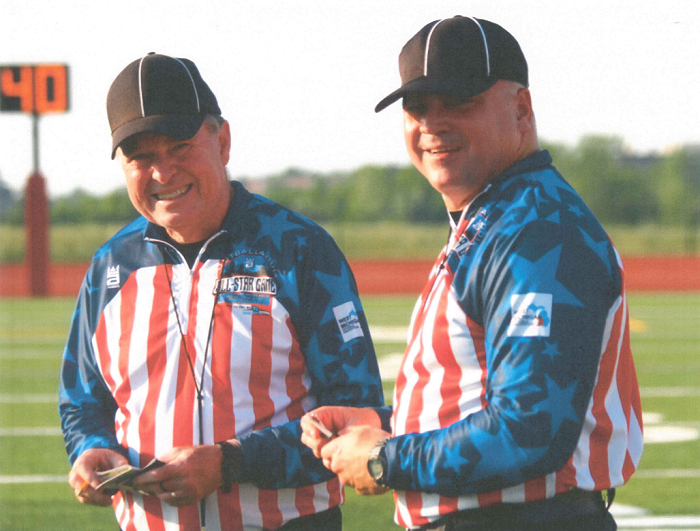 Essenburg laughs about it now, but his five interceptions didn't even earn him Player of the Week honors from the local Holland Optimist Club. Instead, the club inexplicably gave the honor to a defensive lineman.
Essenburg laughs about it now, but his five interceptions didn't even earn him Player of the Week honors from the local Holland Optimist Club. Instead, the club inexplicably gave the honor to a defensive lineman.
It was that last interception Essenburg cherishes the most. His fourth with 1:52 remaining at the Holland 17-yard line had set up a seven-play, 83-yard drive that snapped a scoreless tie. Then on Muskegon Height's next possession, Essenburg grabbed an errant pass and raced 37 yards down the sideline to seal the game with 13 seconds left.
In those days, running games dominated high school football and defensive backs were left virtually on their own, Essenburg said.
"I kept thinking don't let them beat you, don't let them beat you. No one can get beyond you. In those days, once a receiver got in the secondary, they were gone," said Essenburg, who describes himself as a capable defender but no star.
"I wasn't great, but I guess I was pretty good for those days," he said. "I'm proud that I'm in the record book with a verified record."
Essenburg's Holland High School career, which also included varsity letters in tennis and baseball, is part of a lifelong association with prep sports. After playing tennis at Western Michigan, he became Allegan High School's athletic director in 1971 while coaching the tennis team and junior varsity football from 1967-73.
But he's most proud of being a member of the West Michigan Officials Association for the last 47 years. During that time, Essenburg estimates he's officiated more than 400 varsity football games and nearly 1,000 freshman and junior varsity contests. In all, he's worked 83 playoff games, including six MHSAA Finals, the most recent in 2020 at Ford Field. An MHSAA-registered official for 52 years total, he's also officiated high school softball since 1989.
Essenburg also worked collegiately in the Division III Michigan Intercollegiate Athletic Association and NAIA for 35 years, including officiating the 2005 Alonzo Stag Bowl.
Essenburg said the one thing that's kept him active in officiating is being a small part of the tight community and family bonds that make fall Friday nights special.
"I enjoy being part of high schools' Friday night environment," he said. "All that is so good to me, especially the playoffs. It's the small schools and being part of community. I used to say it was the smell of the grass, but now, of course, it's turf.
"I can't play anymore, but I can play a part in high school football in keeping the rules and being fair to both teams. That's what I want to be part of."
While it can be argued high school football now is a far cry from Essenburg's era, he believes his even-tempered attitude serves him well as an official. It's also the first advice he would pass along to young officials.
"My makeup is that I don't get rattled," he said. "Sure, I hear things, but does it rattle me? No. I look at it as part of the game. My goal is to be respected.
"I've never once ejected a coach. It's pretty much just trying to be cool and collected in talking to coaches. It's like, 'OK Coach, You've had your say, let's go on."
While Essenburg is rightly proud of his five-interception record, he believes the new days of quarterbacks throwing two dozen times in a game will eventually lead to his mark falling by the wayside. And that's fine, he said.
"It'll get beaten, no question. It's just a matter of when," he said. "Quarterbacks are so big now, like 6-4, 200 pounds, and they are strong-armed because of weight programs. They throw lots of passes now, so there's no doubt it's going to happen."
Until Essenburg is erased from the record book, he'll take his satisfaction from his connection with Friday Night Lights.
"I love high school sports and being with coaches and players," he said. "My goal was once to work for the FBI or be a high school coach, but now I want to continue working football games on Friday nights until someone says no more."
PHOTOS (Top) Tom Essenburg holds up a copy of the program from the 1962 game during which he intercepted a record five passes for Holland against Muskegon Heights. (Middle) Essenburg, left, and Al Noles officiate an Addix all-star game in Grand Rapids. (Photos courtesy of Tom Essenburg.)

